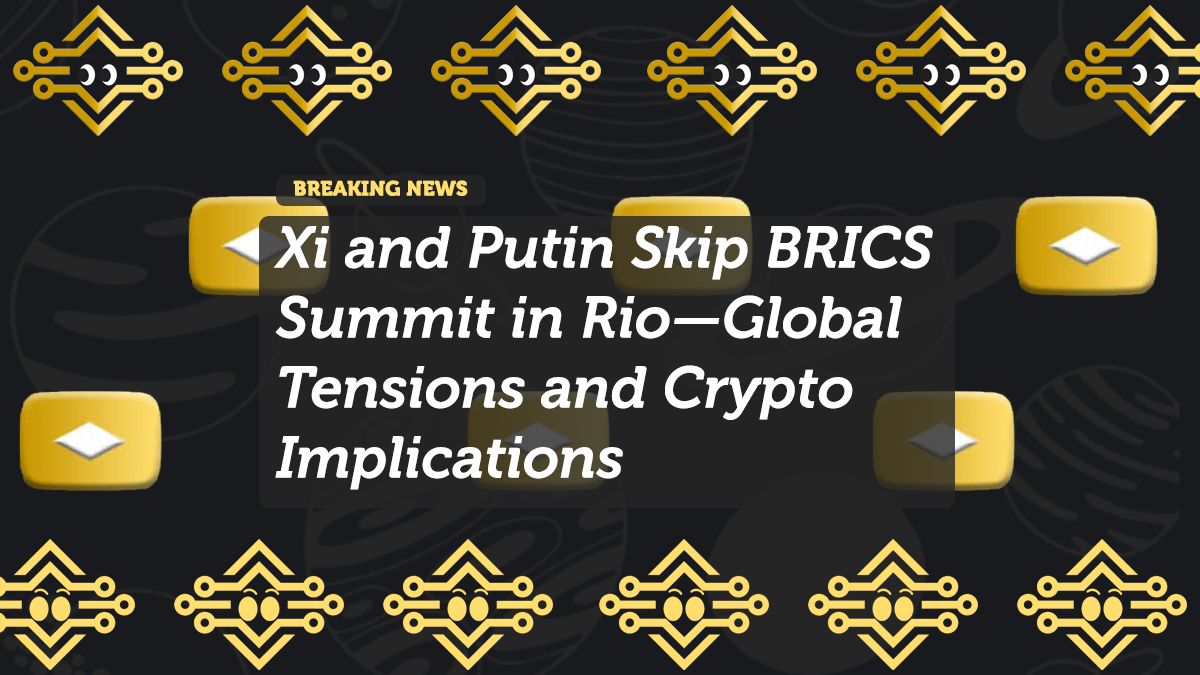
Xi and Putin Skip BRICS Summit in Rio—Global Tensions and Crypto Implications
Well, this wasn’t on anyone’s bingo card. In a surprising and politically loaded move, both Chinese President Xi Jinping and Russian President Vladimir Putin have officially declined to attend the 2025 BRICS Summit in Rio de Janeiro. And while international summits often feature no-shows, having two of the bloc’s biggest power players bail simultaneously? That’s a big deal.
This decision doesn’t just signal diplomatic turbulence within BRICS—it could also reshape the group’s shared ambitions, including the push to challenge the dominance of the US dollar and build a crypto-friendly, multipolar financial system.
So what’s going on, and how might this affect crypto, global finance, and emerging markets?
Let’s break it down.
What Happened?
According to multiple sources, both Xi and Putin have opted out of attending the Rio 2025 BRICS Summit. Their respective governments cited “domestic obligations,” but few buy that explanation at face value.
This marks the first time that both leaders have skipped a BRICS summit since the bloc’s formation. Scheduled to be hosted by Brazil’s President Luiz Inácio Lula da Silva, the summit was expected to address critical issues like:
- Expansion of the BRICS alliance
- A shared payment system or currency
- De-dollarization strategies
- Energy and trade agreements
- Potential blockchain-based infrastructure cooperation
But with Xi and Putin out, the bloc suddenly feels far less united.
Why This Matters: Fractures Inside BRICS?
The BRICS alliance—Brazil, Russia, India, China, and South Africa—has been gaining steam in recent years as an alternative to Western-led financial systems. The bloc recently welcomed new members like Saudi Arabia, Egypt, and the UAE, and it’s been exploring alternative payment rails to reduce dependence on the dollar.
But if China and Russia—the core architects of this alternative vision—are pulling back from public commitments, it raises big questions:
- Is there internal disagreement on how fast to push for a shared currency?
- Are regional conflicts (like the Ukraine war or South China Sea tensions) creating diplomatic distractions?
- Could this reflect rivalries within the bloc, especially with India rising in global influence?
Whatever the reason, this kind of boycott weakens BRICS’ image as a united front.
Crypto Connection: Delayed Momentum for BRICS Currency?
One of the most anticipated developments from BRICS was the potential for a shared currency—possibly blockchain-based or backed by a basket of commodities like gold and oil. This digital infrastructure was meant to bypass SWIFT, challenge dollar dominance, and reduce friction in cross-border trade.
But with the two strongest voices missing from the summit, any talk of launching a BRICS stablecoin or a BRICS blockchain initiative is likely to be postponed—or shelved entirely.
So What Does This Mean for Crypto?
Let’s connect the dots:
- Slower de-dollarization: Without momentum from BRICS, alternative payment systems like stablecoins and central bank digital currencies (CBDCs) may face delayed adoption in emerging economies.
- Less cooperation on crypto regulation: BRICS nations were seen as potential leaders in forming a multi-lateral framework around crypto. With the bloc fragmented, that leadership may be lacking in the short term.
- Flight to Bitcoin or stablecoins: In uncertain times, individuals in emerging markets often lean toward non-sovereign stores of value like Bitcoin—or dollar-pegged stablecoins. This situation could reinforce that trend, especially in countries like Argentina, Nigeria, or South Africa.
What Analysts Are Saying
1. David Woo, Macro Strategist:
“This is a huge diplomatic snub. Without China and Russia, BRICS is basically a discussion forum—not a financial force.”
2. Arjun Mehta, Crypto Policy Advisor:
“I was expecting a BRICS-backed stablecoin proposal to come out of this summit. That’s off the table now. Don’t be surprised if we see more movement toward unilateral stablecoin pilots instead.”
3. Anonymous DeFi Founder:
“Less trust in state-backed alternatives means more faith in decentralized ones. This could be a net bullish signal for Bitcoin over the medium term.”
What Comes Next?
The absence of Xi and Putin doesn’t mean BRICS is dead, but it does throw cold water on short-term cooperation goals. Going forward, watch for:
- Whether BRICS adopts any binding resolutions at the summit
- Brazil and India stepping up as interim leaders
- Independent moves from Russia or China on crypto-friendly infrastructure
- Delays in the rollout of shared payment systems
Final Thoughts
The BRICS Summit in Rio was supposed to be a show of strength—a declaration that the world is entering a post-dollar, multi-currency, crypto-integrated era.
Instead, it’s now a cautionary tale about geopolitical tension and the complexity of building consensus in a divided world.
Crypto believers hoping for a BRICS-backed stablecoin might need to wait a little longer. But at the same time, this fractured moment could boost trustless systems like Bitcoin and Ethereum as neutral, permissionless alternatives.
Because when global alliances hesitate—code keeps running.










